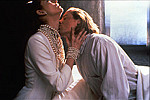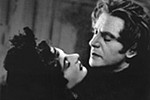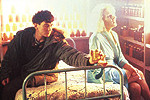 Shadows off the beaten path
Shadows off the beaten pathTHE QUEEN OF SPADES | SALMONBERRIES
< < R E V I V A L S > >
last update 10.Mar.10
See also: SHADOWS FILM FESTIVAL
 R E V I E W B Y R I C H C L I N E
R E V I E W B Y R I C H C L I N E
scr Sylvia Sichel
prd Dolly Hall
with Alison Folland, Tara Subkoff, Cole Hauser, Wilson Cruz, Pat Briggs, Ann Dowd, Leisha Hailey, Shawn Hatosy, Vincent Pastore, Gene Canfield, David Lee Russek, Aaron Harpold
 release US 16.Jul.97,
release US 16.Jul.97, UK 7.Dec.09 dvd
97/US 1h30
BERLIN FILM FEST
 Realistic performances and a sharp rock-chick vibe make this film worth a look. It may have taken more than 12 years for it to arrive in the UK, but it's a strong examination youthful pressures and cultural prejudice.
Realistic performances and a sharp rock-chick vibe make this film worth a look. It may have taken more than 12 years for it to arrive in the UK, but it's a strong examination youthful pressures and cultural prejudice.
In Hell's Kitchen, 15-year-old Claude (Folland) hangs out with her surly pal Ellen (Subkoff), indulging in rivalry and flirtation even as they stay fiercely loyal as friends. A new neighbour, the rocker Luke (Briggs), strikes up a friendship with Claude and encourages her musical exploration. Meanwhile, she gets a job in a local pizzeria and is asked out by the shy Gus (Hatosy). But it's Ellen's homophobic boyfriend Mark (Hauser) who causes problems, verbally and physically abusing Luke and making Claude question everything about her life.
Essentially this is another coming-of-age drama about a young woman discovering that not quite everything her society has prepared her for applies to her. And as the story progresses, Claude slowly finds the strength to stand up to Ellen's obsession with sex and drugs, which are accepted by Ellen and Mark as a part of becoming adults. Claude also has to grapple with her own sexuality, as she's more interested in pink-haired Lucy (Hailey) than nice-guy Gus.
The story is clearly infused with autobiographical material from the filmmakers' lives, which makes it feel thoroughly realistic. The Sichels also don't shy away from the harsh realities of this place and time, from horrific acts of violence and bigorty to the consequences of drug addiction. They capture the urban setting with just enough grit to let us feel what it would be like to grow up there, while the warm performances add a human element that's lacking from some more deliberately edgy films.
In the end, the strongest thing about the film is the sense of yearning we feel in Claude, beautifully portrayed by Folland as a young woman who is trying to make sense of a messy situation and plot a scary course for the future. The tough decisions she makes seem almost offhanded at times, but are actually world-shattering. And since the characters are played with such a vivid balance of attitude and humour, we can't help see ourselves in them.
25.Nov.09
 R E V I E W B Y R I C H C L I N E
R E V I E W B Y R I C H C L I N E
prd Steve Clark-Hall, Antony Root
scr Derek Jarman, Stephen McBride, Ken Butler
with Steven Waddington, Andrew Tiernan, Tilda Swinton, Nigel Terry, Kevin Collins, Jerome Flynn, John Lynch, Dudley Sutton, Jody Graber, Roger Hammond, Allan Corduner, Annie Lennox

release UK 18.Oct.91,
US 20.Mar.92
remastered UK 1.Mar.10
91/UK BBC 1h27
VENICE FILM FEST TORONTO FILM FEST BERLIN FILM FEST
 Based on Marlowe's notorious 16th century play, Jarman's theatrical-style film is bold and imaginative, weaving a provocative statement on gay politics alongside an examination of both corrupting influences and the greed for power.
Based on Marlowe's notorious 16th century play, Jarman's theatrical-style film is bold and imaginative, weaving a provocative statement on gay politics alongside an examination of both corrupting influences and the greed for power.
After the death of his father Longshanks in 1307, Edward II (Waddington) ascends to the British throne and immediately causes a scandal by recalling his banished lover Gaveston (Tiernan) to the court. Edward's wife Isabella (Swinton) doesn't take this lying down, and her fury is echoed by the devious Mortimer (Terry) and Edward's brother Kent (Flynn). Even after Edward finally loses Gaveston, he still neglects the kingdom, turning his attention to Gaveston's friend Spencer (Lynch). So Mortimer and Isabella plot to seize power by passing the crown to Edward's young son (Graber).
Jarman directs in an extremely stylised way. It looks like it was shot in an underground catacomb, with stark lighting, rough-hewn walls and dirt floors. We only see daylight when someone is sent outside the kingdom. In other words, this wasn't the sunniest chapter in British history. The anachronistic costumes, which come from the 20th century, are deliberately startling. And then there's the modern dance, bodybuilding, a rugby scrum and even Lennox on-screen singing Cole Porter's Ev'ry Time We Say Goodbye as Edward and Gaveston are torn apart once again.
Even with all of this, the film maintains a dark and serious tone that really gets under the skin. It may sometimes drift into arch melodrama, but it's consistently smart and evocative. Waddington conveys a wonderfully yearning, lost soul heading for tragedy, and he builds terrific chemistry of all kinds with his costars. The scene-stealers are Swinton and Terry, who seem almost gleeful in their conniving plan. And Swinton's vampire queen moment is seriously chilling.
The facts of Marlowe's history have been questioned; the condensed series of events are based on contemporary accounts and enduring legends. But this is essentially a challenging and moving story of how a man's obsessive love can blind him to everything around him. And as Jarman weaves in the politics of sexuality, from 14th century bedrooms to the streets of 1990s London, he finds resonance that holds up today.
28.Feb.10
 R E V I E W B Y R I C H C L I N E
R E V I E W B Y R I C H C L I N E MUST
MUST  SEE
SEE
prd Anatole de Grunwald
scr Rodney Ackland, Arthur Boys
with Anton Walbrook, Edith Evans, Yvonne Mitchell, Ronald Howard, Mary Jerrold, Anthony Dawson, Miles Malleson, Michael Medwin, Athene Seyler, Ivor Barnard, Maroussia Dimitrevitch, Violette Elvin
 release UK 16.Mar.49,
release UK 16.Mar.49, US 30.Jun.49
reissue UK 26.Dec.09
49/UK 1h35
 Based on a short story by Pushkin, this drama has echoes of Wilde and Dickens in its tale of supernatural temptation in 19th century St Petersburg. It's also been given a lush digital restoration to show off the stunning direction and cinematography.
Based on a short story by Pushkin, this drama has echoes of Wilde and Dickens in its tale of supernatural temptation in 19th century St Petersburg. It's also been given a lush digital restoration to show off the stunning direction and cinematography.
Herman (Walbrook) is a German captain in the Russian army who is frustrated when he loses his entire year's salary in a card game. So when he hears the legend that an ageing local countess (Evans) traded her soul for the secret for winning at cards, he plots to learn the trick. To get into her house, he woos her ward Liza (Mitchell), who is also the object of affection for another officer (Howard). And when Herman confronts the countess, her reaction is seriously haunting, in every sense of the word.
The story is genuinely creepy, and director Dickinson ramps up the freak-out factor with clever camera work and outrageous lighting. Even when things get camp and arch, there's an unsettling tone to this story of a man who simply can't control his own greedy impulses, no matter who he destroys along the way. All of this is augmented with expert cinematography by Otto Heller (Victim) and a moody score by George Auric (Orphee).
Most impressive is the way Dickinson crafts this film to echo Herman's slow slide into insanity, from suspicion and frustration to aggression, gloating and ultimately the world coming apart all around him. We really feel all of this simply because Dickinson refuses to go over the top until the crucial moment. And Walbrook is terrific in the role, dashing but never likeable, even as we begin to feel sorry for him.
Of the rest of the cast, only Evans manages to do something interesting; the countess is wonderfully senile and razor sharp at the same time. We're completely terrified of her, as is everyone else in the story. By comparison, Mitchell and Howard are rather bland as the hapless, good-hearted couple caught in the horror. This is a little-seen film that deserves to find an audience. So let's hope this 50th anniversary restoration does the trick.
21.Dec.09
 R E V I E W B Y R I C H C L I N E
R E V I E W B Y R I C H C L I N E
with KD Lang, Rosel Zech, Chuck Connors, Jane Lind, Oscar Kawagley, Wolfgang Steinberg, Christel Merian, Eugene Omiak, Wayne Waterman, Alvira H Downey, George Barril, Gary Albers
 release Ger 31.Oct.91,
release Ger 31.Oct.91, US 11.Mar.94,
UK 23.Nov.09 dvd
91/Germany 1h35
 Released in the UK for the first time on DVD after all these years, this offbeat drama marches to such a fiercely original beat that it can't be ignored. It's also astonishing to revisit the very young KD Lang in her first film role.
Released in the UK for the first time on DVD after all these years, this offbeat drama marches to such a fiercely original beat that it can't be ignored. It's also astonishing to revisit the very young KD Lang in her first film role.
In the isolated Arctic Circle village of Kotzebue, Alaska, the librarian Roswitha (Zech) is unnerved when a boyish woman called Kotzebue (Lang) starts hanging around and stalking her. Eventually they begin to talk, sharing their stories: Kotzebue was orphaned at birth, possibly an extra girl in an Eskimo family, while Roswitha fled to Alaska after her husband was shot while they escaped from East Germany. Both women are a bundle of insecurities as a result of their pasts, and they find an intriguing, awkward friendship together.
Director Adlon (Bagdad Cafe) shoots this as if it's performance art, packed with surreal touches and suggestive editing. There are offbeat fantasies to demonstrate the obsessions and dreams of the characters, and the whole film has a blackly hilarious tone that's underscored with a moody, bluesy vibe. This echoes in Lang's plaintive single Barefoot, which resonates on the soundtrack and really captures this environment of snow and ice, empty countryside, lively dogs and colourful people.
All of this adds up to a heightened perspective on the story, and Lang plays Kotzebue with a cheeky, mysterious sense of curiosity and discovery. Opposite her, Lech feels like a reluctant mother, harsh but kind and eventually growing into a friend. Their interaction is constantly surprising, especially as they meet other people who are even more off-balance than they are. And when Kotzebue takes Roswitha to Berlin after the Wall comes down, we never expect anything that happens.
In other words, the film feels more like an experience than a movie. And as hidden truths start to emerge, we understand that it's less about the plot than the difficulty of self-acceptance and solitude. Roswitha's home is packed with jars of salmonberry jam that she just can't bear to part with. "I was alone, but now I have a friend," says Kotzebue. And all of us know exactly how they feel.
16.Nov.09


See also: SHADOWS FILM FESTIVAL
© 2010 by Rich Cline, Shadows
on the Wall